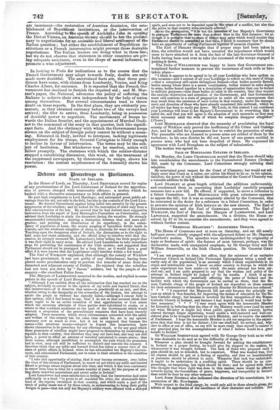In looking to Paris for indications as to the course
that the French Government may adopt towards Italy, doubts are only made more doubtful. The ascertained facts are that three gen- tlemen have come, with claims from Lombardy, Venice, and King Charles Albert, for succours. It is reported that the French Go- vernment has declined to furnish the required aid ; and M. Mar- rast's paper, the National, advocates the policy of suffering the Italians to achieve their own independence by the help of union among themselves. But several circumstances tend to throw doubt on these reports. In the first place, they are evidently pre- mature, as they obtained currency before two of the envoys had arrived ; the first to arrive, from Lombardy, being in possession of doubtful power to negotiate. The movements of troops to- wards the Italian frontier, and the appointment of Marshal Oudi- not to the command of the army in that quarter, look like signifi- cant facts. And the obstinacy with which the Government keeps silence on the subject of foreign policy cannot be without a mean- ing. Educated in Italy, invited to interpose, lacking legitimate employment for his troops, General Cavaignac is likely enough to incline in favour of intervention. The terms may be the sub- ject of hesitation. But whichever way he resolves, action will follow promptly. The sternness with which the soldier-dictator stopped a catechizing discussion, this week, on the treatment of the suppressed newspapers, by threatening to resign, shows his resolution : the instant acquiescence of the Assembly shows his Power.


















 Previous page
Previous page